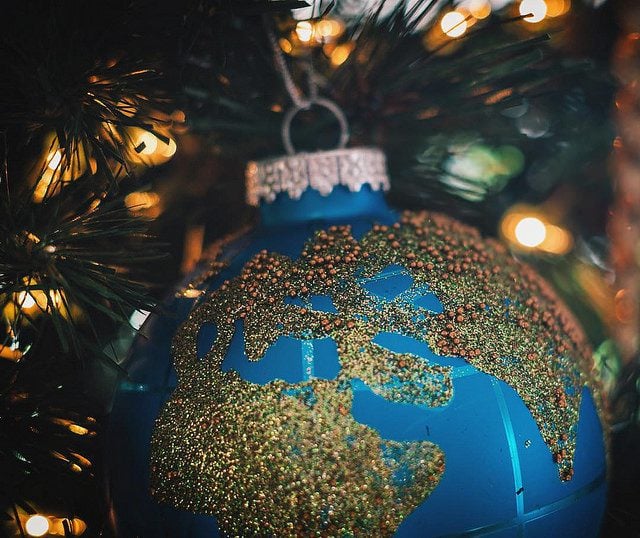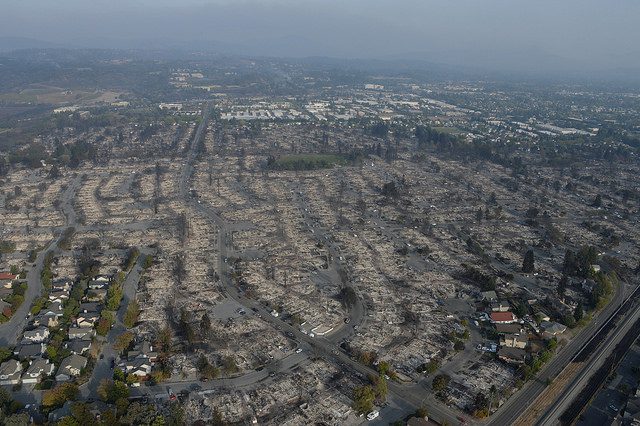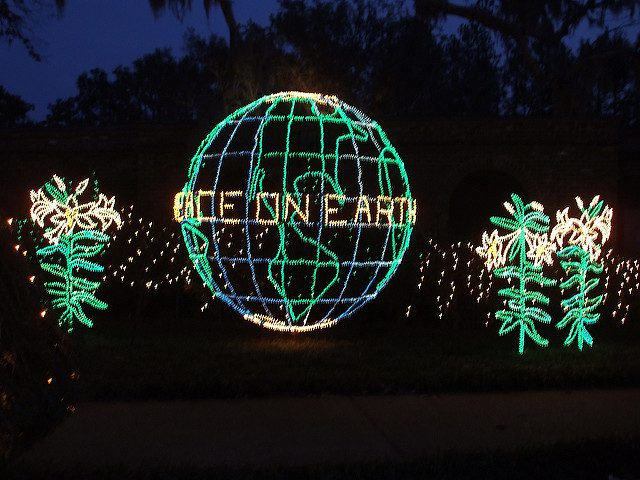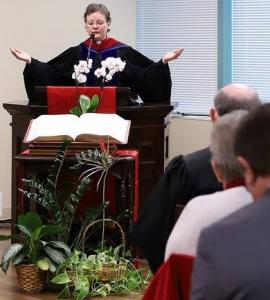In the scripture readings on this holy night, the word peace is repeated often. Isaiah heralds the coming of the “Prince of Peace” (Isaiah 9:7). The angels proclaim “peace on earth” (Luke 2:14). But what does it mean to preach peace when so much of our world is in the midst of just the opposite – war, violence, strife, abuse, and oppression? How can we sing “peace on earth” when even the Earth itself seems engaged in a battle against us, or, rather, humanity battles against Earth?

Texts: Isaiah 9:2-7; Psalm 96; Luke 2:1-14
In August of 2016, Bill McKibben wrote a piece for the New Republic entitled “A World at War” explaining the ways in which climate change is a war that is attacking our human society at every level. The climate war is “a world war aimed at us all,” he said. “And if we lose, we will be as decimated and helpless as the losers in every conflict – except that this time, there will be no winners, and no end to the planet-wide occupation that follows.” He said that the only hope was to mobilize ourselves like we did for WWII.
Here’s what I’m starting to realize. The Great War metaphor is wrong. The problem with the WWII comparison is that the metaphor positions us as “the good guys” who swept in and took care of those evil Nazis and the Empire of Japan. But those of us who live a life of privilege in the West and North are not the good guys this time. We’ve been insisting that we can have our way with the planet while others must bear the brunt of the cost. The United States has been at the forefront of launching the eco-holocaust. We have muscled our way across the Earth, digging, drilling, fracking, pipelining, and toxifying water, land, air, and human health along the way.
It appears, however, that Earth is rising up and fighting back.
When I look at pictures of the charred remains of the California fires, I cannot help but recall pictures I’ve seen of the bombings of Hiroshima and Nagasaki in 1945. I believe the planet is sending us a direct message: surrender and accept the terms of peace.

So I wonder what it would mean to live in peace with Earth on this holy night?
It was into a world ravaged by human hubris and power that Jesus was born. While human civilization was not threatened by anthropogenic climate disruption as it is now, the Roman Empire had imposed its heavy-handed imperial rule over every people it conquered. Their military machine muscled its way across the land, digging and mining, logging vast forests, diverting waterways through its aqueducts. It subjected its conquered peoples to exorbitant taxes that kept them poor, disempowered, and under the constant threat of military violence.
What they did not know is that the Earth itself was rising up and responding to God’s call.
Jesus’ origin story in Luke shows us that the seeds for a moral uprising were embedded into humanity’s story from the beginning.
In Luke 3:23-38, Jesus’ ancestors are traced all the way back to Adam. Adam was himself a child of Earth. From the very soil, God created the first humans, fashioning them out of clay and breath. Yes, they and their progeny sinned and broke the covenant God made with them again and again. But the prophets knew that God was also working within this flawed humanity to bring about a Wonderful Counselor, Mighty God, Everlasting Father, Prince of Peace (Isaiah 9:6). Through the generations, this promise sustained people in their most difficult times. Isaiah reminded the Israelites living in exile far away from their sacred land: “The people who walked in darkness have seen a great light; those who lived in a land of deep darkness, on them light has shined” (9:2).
The story of this light shining in darkness is what we tell this holy night.
We tell the story with shepherds, but not in some pretty, romantic, bucolic hymn.
We tell it with a full-throated song of resistance to the powers that subjugate them and all workers of the field and mines. And assembly lines. And classrooms. We sing this song with all those whose work is disregarded, dismissed and disrespected.
We also tell this story with a man (a descendent of Adam) and his pregnant wife (a descendent of Eve) who must make a journey to be counted by the Roman census. They are counted in order to be taxed, their lives under strict governmental control. Yet she carries within her womb a child who will bring freedom to their people, to all people, to all the Earth.
“For God so loved the world,” not just the human part of the world, but the whole world (John 3:16a).
This child will grow up among the lilies of the field and observe the birds of the air. As he grows up and becomes a rabbi, he will call on them as his teaching partners (Luke 12:24-34). They will try to get through to us that a life spent chasing unnecessary material possessions is not just silly. It violates the lilies and birds themselves as they choke on our trash and plastic and die from our pesticides.
This child will grow up watching Roman boys trained by the state to become ruthless soldiers – soldiers like the ones who killed the Hebrew boys his age, hoping to end his life (Matthew 2:16-18). All in the service of an empire that has no problem sacrificing the bodies of soldiers and citizens alike to protect the wealth of the ruling class. As a rabbi, he will teach his followers about the futility of this wealth not just for the way it manipulates those soldiers, but because of the terror it imposes on the planet and its peoples.
“For those who want to save their life will lose it, and those who lose their life for my sake will save it. What does it profit them if they gain the whole world, but lose or forfeit themselves?” (Luke 9:24-25).
In other words, we must surrender to a higher calling of humility.
We must surrender in obedience to the dictates of God’s Creation. There must be a radical focus on rebuilding a just and equitable society and economic infrastructure focusing on “the least of these” – both human and Earth-kin who have suffered under our oppressive reign.
The Bible shows us that even a suffering Earth raises its voice in lament and protest (Genesis 4:10). In judgement (Psalm 50:1-6). And in praise of our Creator (Psalm 96). Psalm 96:1 addresses Earth not as an object, but as a subject capable of singing to God. “O sing to the LORD a new song; sing to the LORD, all the Earth.”
“Peace on Earth”?
So as we sing a lullaby to Baby Jesus – “sleep in heavenly peace” – and our holiday cards are adorned with fancy fonts reading “Peace on Earth,” what would it mean for peace to be not just on Earth, as if it were just a stage for the human salvation drama, but actually within Earth? What would it mean for us to be partners with Earth in bringing about this peace?

Can we imagine the heavens being glad because air pollution has ceased? Can we imagine the seas roaring with life because the plastics and garbage have been removed? Fields exulting because they are protected from “development” in the form of shopping malls or oil and gas rigs? What would it look like for the remaining trees of the Amazon rainforests to sing for joy, knowing that they are being preserved?
This holy night, our song must be more than sweet lullabies and romantic hymns. Our song must be one of protest and resistance proclaiming that Christ’s birth is bringing righteousness to all the world.
So, yes, let us indeed raise our voices with Creation. “Let the heavens be glad, and let the earth rejoice; let the sea roar, and all that fills it; let the field exult, and everything in it. Then shall all the trees of the forest sing for joy.” (Psalm 96:11-12). Sing with the angels of heaven a song of peace on Earth and with Earth and with all those who live in a place of deep darkness.
Where the smell of ashes still choke the air, sing of peace.
Where the flood waters overcome the boundaries set by God, sing of peace.
Where water runs with poison from lead or fracking fluids, sing of peace.
Where bulldozers rip ancient trees from their roots, sing of peace.
For a child has been born for us, a son given to us; authority rests upon his shoulders; and he is named Wonderful Counselor, Mighty God, Everlasting Father, Prince of Peace. His authority shall grow continually, and there shall be endless peace for the throne of David and his kingdom. – Isaiah 9:6-7

I think of the children who even now are fighting to sue our government to stop climate change, using the power of the law to truly preserve life on this planet – to bring peace.
I think of the Indigenous children who stood up at Standing Rock to claim the sacredness of their land and resist the construction of a pipeline filled with filthy, explosive oil. They did this to bring peace.
I think of the young elected leaders in our country who are challenging their elders to create a “green new deal” – legislation that curbs greenhouse gas emissions and implements a plan to mitigate the worst effects of climate change. They do this to bring peace.
I think of my own children sitting in classrooms where they are learning how science works, and why it matters. How it can be used to understand our world. And how science can help us make informed choices about how we live and work, how we generate electricity, how we structure our economy. They, too, are learning the ways of peace.
When I think of these children, I listen hard to the words of the angel.
“Do not be afraid; for see–I am bringing you good news of great joy for all the people: to you is born this day in the city of David a Savior, who is the Messiah, the Lord. This will be a sign for you: you will find a child wrapped in bands of cloth and lying in a manger” (Luke 2:10-12).
That Christ child was a sign unto us that the Earth itself is rising up and responding to God’s call.
These children today who are resisting and protesting and learning and organizing and legislating are signs unto us that Earth is continuing the rise up and respond to God’s call. Earth is yielding the seeds for a moral uprising that were embedded into humanity’s story from the beginning.
Yes, we have sinned and broken God’s covenant with us again and again. But the prophets knew that God is also working within this flawed humanity so that this Wonderful Counselor, Mighty God, Everlasting Mother/Father, Prince of Peace will work in us and through us.
In this most cursed of generations, we must cling to this promise that sustained people in their most difficult times.
We, too, are living in self-imposed exile far from the sacred land. We are a people who walk in darkness. But we are being shown a great light. Though we live in a land of deep darkness, light is still shining upon us.
“And suddenly there was with the angel a multitude of the heavenly host, praising God and saying, ‘Glory to God in the highest heaven, and on Earth,
in Earth,
with Earth –
peace among those whom God favors!”

Leah D. Schade is the Assistant Professor of Preaching and Worship at Lexington Theological Seminary (Kentucky) and author of the book Creation-Crisis Preaching: Ecology, Theology, and the Pulpit (Chalice Press, 2015).
Twitter: @LeahSchade
Facebook: https://www.facebook.com/LeahDSchade/
Read also:
Mary, Pondering and God-bearing: Part One













